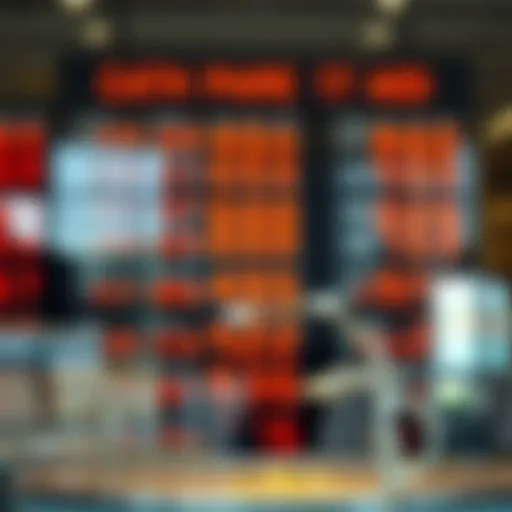Exploring Sahor Time in Dubai During Ramadan


Intro
Understanding the concept of Sahor time in Dubai is essential for those observing Ramadan, whether they are residents or visitors. This pre-dawn meal holds significant cultural and spiritual meaning, playing a pivotal role in the daily routines of Muslims during this holy month. As the sun rises, so too does the realization of just how integral Sahor is. It's not merely about food; it encompasses moments of community, reflection, and preparation for the fast ahead.
In a city as bustling and diverse as Dubai, Sahor creates a unique tapestry of traditions and practices. From early morning gatherings in homes to special offerings in restaurants, the atmosphere changes dramatically as the time approaches. The heart of Sahor lies not just in what is consumed but in the way it fosters connections among people, drawing families and friends together.
When one dives into the intricacies of Sahor time, it quickly becomes clear just how vital it is for those partaking in fasting. This article aims to illuminate various aspects associated with Sahor, including its timing, cultural relevance, and how it influences lifestyle choices during Ramadan in Dubai. By exploring its diverse facets, we can appreciate the profound impact Sahor has on both individual lives and the broader community.
Understanding Sahor Time
Sahor time stands as a pivotal element for Muslims in Dubai during the holy month of Ramadan, encapsulating both a spiritual practice and a social gathering. It’s not just about eating a pre-dawn meal; it symbolizes the essence of community, faith, and discipline. Understanding this unique time helps with grasping the intricacies of daily life in this vibrant city as traditional practices meet modern living.
The Importance of Sahor Time lies in its role in preparing individuals for the day of fasting. It offers nourishment, both physical and spiritual, and creates a sense of togetherness among family and friends. For investors, homebuyers, and property managers, knowing the cultural significance of Sahor can highlight potential opportunities in both the real estate market and local business ventures.
In addition, understanding Sahor encourages respect for local customs, essential for anyone looking to engage positively in Dubai’s rich cultural tapestry. It enables visitors to connect meaningfully with the community, which adds depth to their experience during Ramadan.
Definition of Sahor
Sahor, sometimes spelled Suhoor, refers to the pre-dawn meal consumed by Muslims before they begin their fast for the day during Ramadan. This meal is characterized by a variety of foods that are not only filling but also nutritious, helping to sustain individuals throughout the hours of fasting. The timing of Sahor is crucial. It is traditionally consumed in the last moments before the Fajr prayer, which marks the beginning of the fast.
For many, it serves as more than just a meal; it’s a ceremony, a time for reflection, and togetherness. On a typical day, families may gather around the table, sharing dishes that may include savory items like foul (fava beans), hummus, and hearty breads, alongside refreshing fruits and yogurt.
Historical Context
The observance of Sahor has roots deeply embedded in Islamic tradition, particularly dating back to the time of the Prophet Muhammad. Historical accounts emphasize that the practice of consuming a pre-dawn meal not only nourished the body but also enriched the spirit, preparing believers for the day of fasting ahead. The importance of this meal is highlighted in several Hadiths, which stress the benefits of eating before dawn.
Over the years, Sahor has evolved with cultural influences, blending traditional dishes with modern culinary practices. In Dubai, the meal often incorporates local flavors and ingredients, making it a distinctive experience. In historical contexts, Sahor was also a way to strengthen community ties, as families and neighbors would come together to share food and prayers before the fast begins.
Today, Sahor continues to hold a vital position in the Ramadan experience for the Muslim community in Dubai. This practice not only affirms their faith but also reflects the values of hospitality and unity, central to the culture of the UAE. Understanding this significant custom allows visitors and residents alike to appreciate the deeper meaning behind this essential part of Ramadan.
Significance During Ramadan
The significance of Sahor during Ramadan cannot be overstated. This pre-dawn meal serves not merely as a nutritional necessity but as an integral part of the spiritual experience that defines the holy month for Muslims. Unlike any ordinary meal, Sahor lays the groundwork for a day devoted to fasting, prayer, and reflection.
Religious Importance
From a religious perspective, Sahor is deeply enshrined in Islamic tradition. It's believed to be an act of following the practice of the Prophet Muhammad, who emphasized the virtues of partaking in this meal before embarking on a day of fasting. It’s considered sunnah, meaning a practice that exemplifies the teachings of the Prophet.
Moreover, sharing Sahor with family and friends reinforces bonds and fosters a sense of community. This moment before dawn, often filled with quiet conversations and shared prayers, invites a lingering sense of unity and gratitude, thus amplifying the spiritual essence of Ramadan. In Dubai, as in many other Muslim-majority cities, this practice creates a unique atmosphere where the community comes together, further enriching the collective experience of fasting.
"Eating Sahor together reminds us that we're in this together, not just for ourselves but for our faith and community."
Cultural Practices
When it comes to cultural relevance, Sahor encompasses a variety of traditions unique to each family or region. In Dubai, you can find an abundant array of breakfast options—ranging from traditional dishes like foul medames (stewed fava beans) to balaleet (sweetened vermicelli). The meal varies, of course, depending on personal and familial preferences, infused with both local flavors and recipes handed down through generations.
Culturally speaking, Sahor is more than just a meal; it’s an entire experience packed with rituals that highlight the month’s significance. Many families wake up early, often stirring as a result of the adhan (call to prayer), creating an atmosphere brimming with anticipation. Some even organize small gatherings where neighbors and friends come together, further promoting the spirit of generosity and shared faith. The act of gathering around a table piled high with food transforms an everyday meal into a shared celebration.
In addition, local eateries play a significant role during Ramadan. They often extend their hours and provide specific Sahor menus, catering to the diverse tastes of the population. This artistic blend of tradition and contemporary lifestyle reflects Dubai’s rich multicultural fabric during this holy period, drawing in residents and visitors alike—elevating Sahor from mere sustenance to a cherished cultural cornerstone.
Sahor Timing in Dubai
Sahor, the pre-dawn meal during Ramadan, plays a pivotal role in the daily routines of Muslims in Dubai. Understanding the timing of Sahor is crucial, not just for spiritual adherence, but also for daily planning, especially for those balancing work, family commitments, and religious observance.
The way Sahor timing is communicated and interpreted varies across different demographics, and hence it's vital for individuals, families, and even businesses to grasp the nuances involved. Getting this timing right is about more than just filling the belly before the fast; it sows the seeds of communal bonds and cultural continuity.
Calculation Methods
The calculation of Sahor timing takes into account both geographical and astronomical factors. Generally, it is aligned with the Fajr prayer, which happens at dawn. In Dubai, precise timing is essential as it can change daily due to variations in sunrise and daylight savings adjustments.
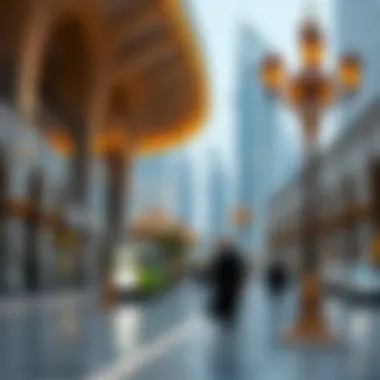
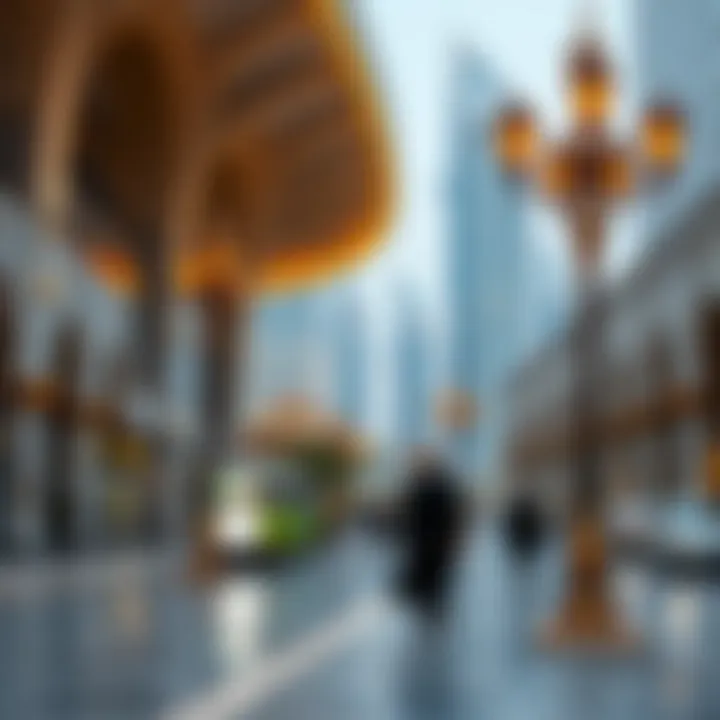
Often, families will resort to Islamic calendars, specifically adapted for local conditions. These calendars not only mark the month of Ramadan but also provide precise hours for Sahor, noted in a 24-hour format for clarity. A common practice among many is checking local news outlets or mobile applications that specialize in Islamic prayer times. These apps help determine the exact moment for Sahor, which typically is around 4:30 AM, though it will vary.
Variations by Date
Sahor times can significantly fluctuate as Ramadan progresses. For example, at the start of the month, the Sahor timing will tend to be earlier because of the shorter days. As the month progresses, it can shift slightly later. Here’s a quick breakdown:
- Early Ramadan (Days 1-5): Around 4:10 AM
- Mid Ramadhan (Days 10-20): Roughly 4:30 AM
- Late Ramadan (Days 21-30): Up to 4:50 AM
Such changes mean planning meals in advance and ensuring that families are gathered and ready to eat in time. Notably, those who strictly follow traditional practices will often spend the last few nights intensively preparing for Eid al-Fitr after Ramadan concludes.
Local Prayer Timings
Local prayer timings go hand-in-hand with Sahor timing in Dubai. The Fajr prayer is the call for the faithful to break the fast, and getting it right is paramount. During Ramadan, local mosques make concerted efforts to ensure that the timings are accurate, often displaying them openly for the community. Technological aids often accompany this, with numerous electronic boards in mosques announcing prayer times with real-time updates.
Here are some notable sources for prayer times in Dubai:
Impact on Daily Life
The notion of Sahor, the pre-dawn meal during Ramadan, has a ripple effect that extends well beyond the dining table. It shapes not just the spiritual lives of those observing the fast, but interweaves itself into daily routines of individuals and families in Dubai. The common threads of community, nutrition, and time management play a pivotal role in defining how residents navigate this holy month.
Morning Routines
In Dubai, mornings during Ramadan take on a distinct identity. The time before dawn becomes a precious moment for reflection and preparation. For many Muslims, the wake-up call for Sahor can feel like an intricate dance against the clock. Often, families and friends come together, engaging in lively conversations while indulging in wholesome dishes designed to sustain them throughout the day.
- Meal choices typically range from nutritious oatmeal and flatbreads to fruits and high-protein foods such as eggs. This focus on a balanced diet becomes crucial, as it fuels their activities and helps them manage the day's fast.
- Artificial light from street lamps and the hum of early morning traffic mingle, creating an atmosphere of serenity tinged with anticipation as they savor their last meal before the sun rises.
The act of preparing Sahor isn't merely a physical necessity; it is also a ritual enriched with meaning. Some families might recite prayers or share reflections on their hopes for the month ahead. This communal aspect strengthens bonds and fosters a sense of unity among participants.
Dining Preferences
Food choices during Sahor reflect a careful balance of tradition and convenience. In a city like Dubai, where culinary options abound, people will often seek a blend of flavors and nourishment.
- It's not uncommon to find individuals gravitating towards local dishes, such as foul medames and can sometimes even indulge in more contemporary offerings, from Asian stir-fries to protein shakes. This mix of flavors allows for personal preference while still honoring cultural customs.
- Eating habits may lead to exploration of restaurants that offer specialized Sahor menus, drawing in diners who wish to partake in the atmosphere without the hassle of cooking.
For many, the communal dining experience takes precedence over individual meals. Families may invite friends to join them in homes or select eateries, creating a vibrant tapestry of shared stories and laughter. This social aspect of Sahor nourishes both body and spirit, enhancing its significance in the larger canvas of residents' lives.
"During Ramadan, the soul is nourished as much as the body. Sahor is that unique blend of sustenance and community, forged in the stillness of the early morning."
Practical Considerations
When discussing Sahor time in Dubai, practical considerations become crucial. This aspect not only deals with the tangible preparations required but also intertwines with the broader experiences Muslims undergo during the holy month of Ramadan. Understanding these elements can lead to a more enriching engagement with the local culture and traditions.
Preparation Tips
Preparing for Sahor extends beyond just setting an alarm for early morning meals. It is about creating an atmosphere conducive to spiritual reflection. Here are some tips to keep in mind:
- Plan your meals ahead: Before Ramadan starts, think about the types of foods you want to include in your Sahor. Going for a mix of carbohydrates, proteins, and hydration-rich foods can be beneficial. Items like oatmeal, eggs, and fruit help sustain energy levels throughout the day.
- Stay hydrated: The importance of hydration cannot be overstated. Incorporating plenty of water, or drinks with electrolytes, is essential. Before sleeping, drink enough fluids to ensure your body stays hydrated during fasting hours.
- Set realistic expectations: Especially if you're new to fasting, don't overwhelm yourself with large meals. It is better to start small and see how your body responds, gradually adjusting your intake as needed.
- Establish a routine: Consistency can ease the transition into Ramadan. Try to wake up at the same time each day, allowing your body to acclimate to the new schedule.
Dining Options
When it comes to dining during Sahor, the variety in Dubai can be both exciting and overwhelming. Many eateries adapt their menus for this special time, catering specifically to the needs of those practicing the fast. Here are notable options:
- Local favorites: Places like Al Fanar Restaurant and Cafe offer traditional Emirati dishes, ensuring a cultural taste.
- International cuisine: Many restaurants provide expansive menus that include Asian, Middle Eastern, or Western cuisines. From biryanis to pasta, the options are endless.
- Casual venues: Coffee shops and cafes in Dubai often extend their hours and serve Sahor-friendly menus, making it easy to grab a quick bite without much fuss.
- Healthy catering services: Some businesses focus on healthy meal prep tailored for Sahor. These meals are usually gluten-free and include organic ingredients, catering to health-conscious individuals.
Eateries Open During Sahor
With the bustling environment in Dubai, numerous eateries remain open well into the night and early morning, ensuring that people can enjoy Sahor without any hassle. Here are some noteworthy establishments:
- The Sum of Us: Known for its hearty breakfasts and artisanal approach, this cafe often has custom Sahor packages.
- Karak House: A go-to for locals craving the famous spiced tea along with freshly made pastries.
- Zaatar W Zeit: Offering a twist on traditional favorites, they focus on mana'eesh which can be a delightful Sahor option.
- Dubai Mall eateries: Several outlets in this iconic shopping destination have extended their hours during Ramadan, bringing varied dining choices right to the heart of the city.

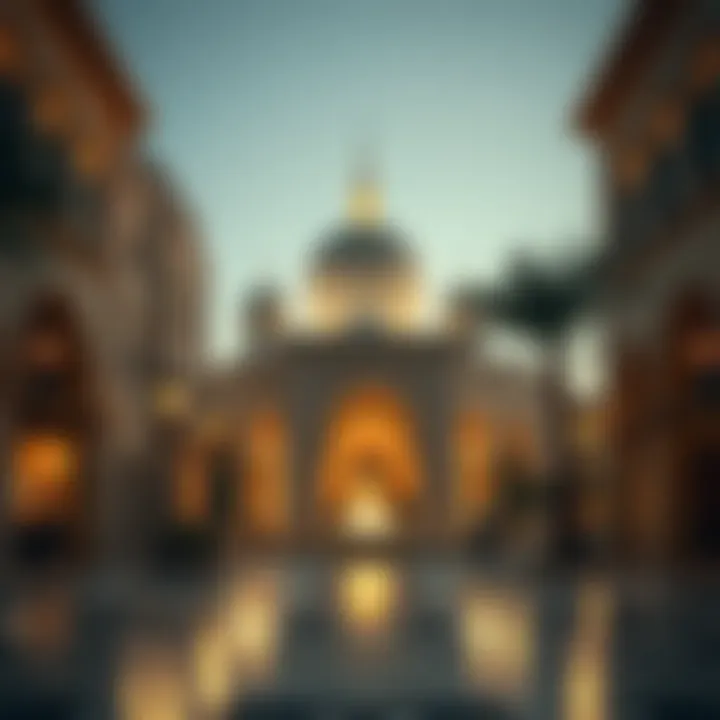
In summary, understanding the practicalities of Sahor in Dubai is essential for a fulfilling experience during Ramadan. Be it creating a meal plan, knowing where to dine, or identifying eateries that cater to early risers, being prepared goes a long way in enjoying this significant period.
Community Events
Community events during Ramadan, especially those surrounding Sahor time, play a pivotal role in shaping the social fabric of Dubai. The act of gathering with family and friends to break the fast not only fosters bonds but also strengthens communal ties. Events centered on Sahor help create a sense of belonging, allowing everyone to embrace the spirit of generosity and camaraderie that the holy month embodies.
Local Gatherings
Local gatherings often transform into vibrant hubs of shared experiences. Many neighborhoods, cafes, and community centers take the initiative to host Sahor dinners, providing both residents and visitors with an opportunity to connect. These gatherings often highlight traditional foods that are passed down through generations, offering a culinary journey into the heart of Arabic culture.
- Beneficial Interactions: Attending local Sahor gatherings can provide invaluable insights into the cultural nuances of Dubai. For investors and potential homebuyers, participating in these events is a strategic way to network and understand community dynamics.
- Welcoming Atmosphere: The essence of these gatherings lies in their inclusivity; all are welcome, regardless of background. This open-handed approach fosters a peaceful environment, making it easier for newcomers to feel at home.
The cozy atmosphere often leads to robust conversations about Ramadan traditions, food preferences, and even the local housing market. Such interactions can help potential property managers understand the types of amenities and communal spaces that are highly sought after by residents during this period.
Cultural Festivals
Cultural festivals during Ramadan serve as a tribute to the rich heritage of the UAE. These festivals often include Sahor-themed activities, local craft displays, and music performances, blending tradition with a modern twist.
For example, the annual Ramadan Night Market in Dubai features stalls that focus on late-night dining options, showcasing a variety of local delicacies ideal for Sahor. Visitors can indulge in:
- Arabic sweets such as Kunafa and Baklava, which are rich in flavor and enjoyed during Sahor.
- Savory dishes including Shakshuka, a dish of poached eggs in a spicy tomato sauce, often enjoyed during the Sahor meal.
"Participating in cultural festivals allows everyone to immerse in the traditions, creating a cultural bond that transcends mere festivities."
These festivals not only enhance the community spirit but also attract tourists, contributing positively to the local economy. For investors, this is a prime opportunity to observe and engage in the local market while exploring potential investments in hospitality and related sectors. Festivals often serve as platforms for showcasing new housing projects, allowing property developers to highlight features that resonate with both locals and tourists.
Through community events, whether they be local gatherings or grand cultural festivals, the essence of Sahor time is about connection—a time where people share more than just a meal; they share experiences, cultures, and their hopes for the future.
Sahor Across the UAE
Navigating Sahor across the United Arab Emirates can be an enlightening experience. It allows for a greater appreciation of how different emirates observe their pre-dawn meal during Ramadan. This section sheds light on the variances in traditions and practices among the UAE's Emirates, helping readers understand the broader cultural landscape.
Comparison with Other Emirates
Each emirate exhibits its own distinct flavor in celebrating Sahor. For example, in Abu Dhabi, the emphasis is often on communal gatherings, with families sharing long tables laden with traditional dishes. Residents may favor local favorites such as foul medames and hummus, bringing a unique perspective to their Sahor experience.
In contrast, Sharjah typically showcases more family-oriented practices. Here, the evening prior to Ramadan may see bustling night markets, with early risers flocking to purchase fresh offerings, including pastries and dates, to enjoy in the early hours.
- Ajman, being smaller, has a closer-knit community feel. Breakfast options tend toward home-cooked meals, with more emphasis on simplicity, as families may gather around the table discovering the pleasure in each other's company.
- The vibrant city of Dubai, with its blend of cultures, provides an international twist to Sahor. Here, you might find restaurant meals arriving with more exotic offerings, perhaps a fusion of Arabic and South Asian cuisines, catering to the diverse population.
The timing of Sahor also differs subtly between emirates. While the call to prayer may biennially announce end times, dishes preferred and discussions shared breathe life beyond the meal itself.
Temperature and Timing Variations
Temperature and timing variations can greatly influence the experience of Sahor in different parts of the UAE. During Ramadan, which fluctuates with the lunar calendar, the warmer months present unique challenges.
- Dubai, notorious for its hotter climate, witnesses temperatures rising significantly leading up to the fasting period. This means that Sahor might be a matter of taking a quick bite under stifling heat. Mornings may sway to cooler conditions but by Abu Dhabi, one might feel the heat extending even into the twilight hours.
- In the northern emirates, like Fujairah, temperatures tend to be relatively milder, especially with its proximity to the coast. Here, Sahor can often be enjoyed with a pleasant sea breeze, making it a completely different experience.
The impact of temperature extends to food choices too. In hotter climates, many may choose lighter fare and hydrating options during Sahor—fruits, yogurt and light cereals. Conversely, in milder climates, traditional heavier meals might still be the preference.
In closing, understanding Sahor time across the UAE reveals a rich tapestry of cultural practices influenced by local traditions and environmental conditions. This awareness not only assists residents and visitors in feeling more connected during Ramadan but also appeals to investors and homebuyers considering the varied lifestyle offerings throughout the emirates.
Influence on Real Estate
Understanding the dynamics of Sahor during Ramadan extends beyond personal lifestyle choices; it significantly affects the real estate market in Dubai. This influence manifests in various ways, particularly through property values and rental demand. As investors and homebuyers consider their options, recognizing how this unique cultural practice weaves into the fabric of daily life is essential for making informed decisions in the bustling Dubai property market.
Property Value Trends
Sahor time, while traditionally viewed through a religious lens, begins to alter the perception of residential spaces in Dubai. As the month of Ramadan approaches, certain properties tend to see increased interest due to their proximity to cultural and community hubs where Sahor meals are served. For instance, homes near popular eateries, mosques, or community centers often experience a boost in market value.

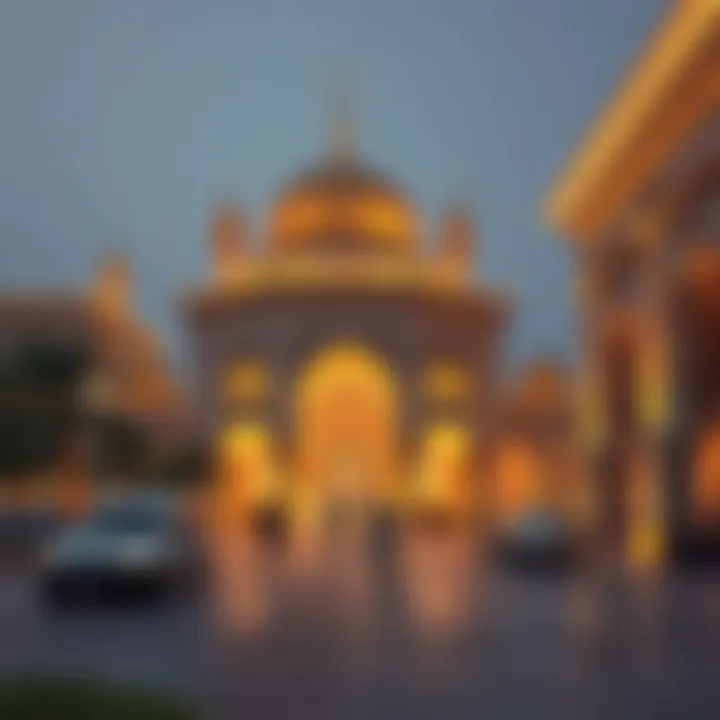
It’s vital to consider how different neighborhoods respond to the demand spike as Ramadan unfolds. Areas like Al Barsha and Jumeirah often capture attention because their vibrant food offerings and well-established communities create an inviting environment for families looking to break their fast with a mix of culinary delights. This is not just about demand; it’s about understanding the psyche of potential buyers who often seek neighborhoods that foster a sense of community during this sacred time.
Investors who keep their ears to the ground may find lucrative opportunities in houses or apartments that provide added amenities that support a family-oriented lifestyle during Ramadan, such as spacious dining areas or outdoor spaces for family gatherings. In many cases, such properties not only retain but can appreciate in value during the months leading up to Ramadan due to shifting buyer priorities.
Rental Demand During Ramadan
The rental landscape in Dubai also shifts remarkably during Ramadan. Many expatriates and transient workers seek short-term accommodations to immerse themselves in the culture or enjoy Ramadan both in its commercial and spiritual dimensions. This influx can create a surge in demand for furnished apartments or villas, especially in locales known for their lively after-hours scene when the fasting ends.
For instance, neighborhoods like Downtown Dubai and Dubai Marina are particularly attractive not only for their vibrant nightlife but also their easy access to Sahor venues offering a mix of traditional and contemporary dishes. Rental prices in these coveted areas can skyrocket during Ramadan, often leading to bidding wars as potential tenants scramble for the ideal location.
"Understanding the fluctuations in rental demand during Ramadan is crucial for landlords and investors. Those ready to adapt to the seasonal changes may see substantial returns."
In older districts, the shift in rental demand can look quite different. Here, prices may stabilize as long-term residents focus on maintaining familiarity rather than changing addresses seasonally. This makes areas with historical significance appealing to those seeking deeper cultural immersion.
By aligning investment strategies with the ebb and flow of demand driven by cultural practices like Sahor, investors can benefit from a more nuanced understanding of the market. Keeping an eye on how these dynamics evolve can lead to smarter investment decisions throughout the year—besides just during the holy month of Ramadan.
Health and Nutrition
Understanding Sahor time also involves a deeper look into health and nutrition. The meal before dawn isn't just a tradition; it plays a crucial role in maintaining the physical well-being of those observing fast during Ramadan. The choices made at Sahor can significantly impact energy levels, overall health, and hydration throughout the day.
Nutritional Balance During Sahor
To achieve optimal nutritional balance during Sahor, one must consider several factors. A balanced Sahor meal aids in sustaining energy during the long hours of fasting. Key components should include:
- Complex Carbohydrates: Foods like oats, whole grain bread, and brown rice slowly release energy. This helps stave off hunger and maintains stable blood sugar levels.
- Proteins: Including eggs, yogurt, or legumes can help maintain satiety. Proteins are also essential for repairing tissues and building muscle, both of which need careful attention during fasting.
- Healthy Fats: Nuts and seeds can provide energy and important nutrients, but should be consumed in moderation due to their calorie density.
- Fruits and Vegetables: They not only provide vitamins but also hydration and fiber. Hydrating fruits like watermelon or oranges can be particularly beneficial.
A well-rounded Sahor meal might resemble a hearty porridge topped with fresh fruits, a side of boiled eggs, and a handful of nuts. Such a combination ensures that one not only feels full but also equipped with the energy needed to undertake daily activities.
Hydration Strategies
Hydration is another pivotal aspect of planning Sahor. As the sun rises and temperatures rise, staying hydrated becomes essential. Here are a few strategies that can help maintain hydration levels throughout the fasting period:
- Drink Water Wisely: Aim for two to three glasses of water during Sahor. Spacing out consumption, rather than chugging it down, can aid absorption.
- Avoid Caffeine: While coffee and tea are popular options, they can lead to dehydration. Opting for herbal teas or simply more water can be a smarter choice.
- Electrolyte-Rich Foods: Incorporating foods like bananas or yogurt during Sahor can help maintain the body's electrolyte balance.
- Limit Salt Intake: High-sodium foods can lead to increased thirst during fasting hours. Keeping salt to a minimum can help avoid discomfort.
For those living in Dubai, hydrating properly and planning meals carefully during Sahor could make the fasting period more manageable and enjoyable. Understanding these health principles is key to maximizing energy and maintaining well-being throughout Ramadan.
"A balanced Sahor is not just about tradition; it’s a crucial factor in supporting health during fasting hours." source
Available resources that can assist in meal planning during Ramadan are helpful. Websites such as healthyeating.org provide practical health tips and recipes designed to complement the fasting experience.
Finale
In wrapping up this exploration of Sahor time in Dubai during Ramadan, it's crucial to understand its multifaceted role within both the religious and cultural frameworks of the city. Sahor isn’t just a meal; it’s a pivotal moment that shapes daily lives, weaving together traditions, community bonds, and individual practices.
Key elements include:
- The religious significance of Sahor, as it marks the transition into fasting, holds considerable weight for Muslims worldwide.
- It reflects on cultural identity, with local customs impacting how families and individuals celebrate.
- Practical considerations, such as specific dining options and timing, make it a unique experience that varies greatly, not just from location to location but often within individual households.
Benefits derived from observing Sahor:
- It encourages healthy eating habits, fostering awareness about nutrition and hydration, particularly in a climate like Dubai’s.
- There’s heightened community engagement, with local gatherings and discussions on the importance of fasting fostering connections among residents.
- Real estate trends are subtly impacted as neighborhoods buzz with an influx of people seeking authentic Sahor experiences, thereby enhancing property visibility and increased demand.
Ultimately, the significance of Sahor time extends beyond just religious observance; it shapes the social fabric of Dubai, influencing lifestyle, community engagement, and even real estate dynamics.
Summary of Key Points
To reiterate the core aspects discussed, Sahor time in Dubai encompasses:
- The definition as pre-dawn nourishment.
- Its historical context, rooted deeply in Islamic tradition.
- Cultural significance during Ramadan, blending various practices and beliefs.
- Specific timing considerations, including calculation methods and regional variations.
- The impact on daily life, revealing changing morning routines and dining preferences.
- Practical preparation tips and the availability of eateries open for Sahor.
- The role of Sahor in community events and gatherings across the city.
- Regional comparisons within the UAE, highlighting the unique distinctions among emirates.
- The dynamics affecting property values and rental demand during Ramadan.
- Insights into health and nutrition, emphasizing balanced diet choices and hydration strategies.
Future Trends
Looking ahead, it is anticipated that Sahor practices will continue to evolve, adapting to lifestyle changes and modern influences. Several trends may emerge:
- With the rise of technology, many will utilize apps and online tools to keep track of Sahor timings and recipes, marrying tradition with convenience.
- Increased interest in health and wellness is likely to shape the types of food consumed during Sahor, urging a shift towards more nutritious and hydrating options.
- The influence of international cuisine may evolve Sahor menu offerings as Dubai continues to be a melting pot of cultures, introducing a wider array of dishes.
- Real estate may see renewed focus due to Ramadan's impact on social dynamics, with properties in popular areas drawing increased interest.
In summary, the ongoing awareness of Sahor time, enriched through cultural significance and practical considerations, continues to be an integral part of life in Dubai, shaping both individual experiences and broader societal trends.



